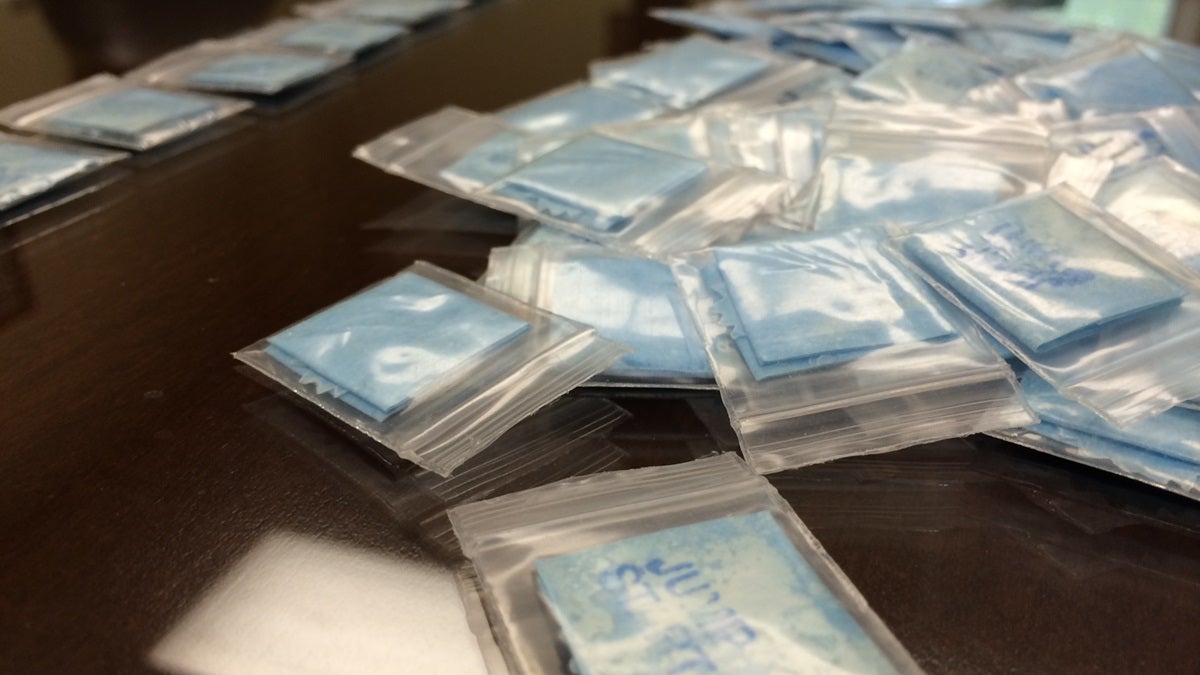Delaware expands addiction treatment services [video]

Bags of heroin seized by Wilmington Police. (Shirley Min/WHYY)
Delaware leaders are hopeful a second drug detox center and a new public awareness campaign will help rein in Delaware’s addiction epidemic.
Over the past several months, Gov. Jack Markell along with state lawmakers, addiction treatment providers and advocates have worked together to try to fill in the gaps in the drug treatment system.
During a news conference Tuesday, Markell announced the first part of the plan. He said the state will open a new detox center in Lewes in the first quarter of next year to serve people in Sussex and Kent Counties.
“We heard the pleas of families in the southern part of our state and no longer will they have to drive their loved ones to New Castle County to receive withdrawal management treatment,” said Markell, in the chapel located on the Dept. of Health and Social Services’ campus in New Castle.
This past session, the General Assembly approved $950,000 in funding to help pay for the new detox center. Markell also touted a more individualized approach to treatment in each of the state’s two detox locations.
“The treatment services will focus on variable length of stay and intensity based on a person’s needs, replacing the one-size-fits-all approach that we currently have,” he said.
Markell added the state will also double the number of available slots in targeted care management from 35 to 70. Targeted care management assigns addicted individuals who need monitoring to engage in or adhere to treatment with managers called “care coordinators.” Together the pairs work towards sobriety.
And finally, Markell announced the opening of additional Oxford Houses in Delaware. The sober living homes will increase capacity by about 20 percent statewide with 450 beds available, up from 375 currently. The state’s Division of Substance Abuse and Mental Health’s revolving loan program will finance that expansion.
“I am committed to opening the doors to addiction treatment for more of our fellow Delawareans because I believe that people deserve the opportunity to reach their full potential and that’s free from the pain that addiction brings,” Markell said.
Help is here
Tuesday’s news conference also served as the public launch of the new website designed as a one-stop-shop to help connect people with treatment services. Delaware DHSS Secretary Rita Landgraf said HelpisHereDE.com puts an emphasis on prevention, treatment and recovery while simultaneously trying to reduce the stigma of addiction.
“In an epidemic, you always need additional resources to actually turn that tide and indeed get more individuals into recovery,” said Landgraf, who is working with the Division of Substance Abuse to propose adding even more treatment services in FY 2016.
And she pointed out that many treatment services are now fully covered.
“Through the Affordable Care Act and our recent Medicaid state plan amendment, many treatment services will now be fully reimbursed by Medicaid,” Landgraf said. “We are trying to leverage any resources that we have available here in Delaware to expand our service delivery and our redesign efforts.”
“These are outstanding first steps, things that really need to be done,” said Don Keister, whose son Tyler died of an accidental heroin overdose almost two years ago. “I know that the detox situation is extremely important, that we get help to the lower part of the state and that we’re also relieving the upper part of the state.”
After Tyler’s death, Keister and his wife Jeanne founded Attack Addiction, a resource and support group for families plagued by addiction. Keister described having a single website to turn to with treatment options as a lifesaver, literally.
“A place to sit down and gain information is phenomenal. I mean, they can take this website, people can get the kind of help that they need, know where to go and know what to do,” said Keister, who recalled spending hours online and on the phone looking into treatment options for his son.
The Attack Addiction founder said the next step is to ensure that no one who needs help ever gets turned away.
“Whether it’s a family member that has concerns about their son or daughter, or husband or wife, or whether it’s someone that needs help that’s in active addiction, wherever stage they are, that they get the right help that they need without saying, ‘Come back and see us later,'” Keister said.
Reduce demand
When Delaware tightened controls on prescription painkillers between 2012 and 2013, the number of Delawareans seeking public treatment for heroin addiction increased almost 50 percent, according to state numbers.
Since the beginning of this year, Markell said 132 people have died of suspected overdoses, which is more than 16 people per month. Markell said that exceeded the number of people who died in car crashes in all of last year.
“One thing that those numbers don’t measure is the mental, and the emotional and the financial toll that addiction takes on individuals and on their families,” said Markell, who is focused on reducing demand.
Part of that effort, the governor said, is to educate and prevent substance abuse among young people before they get addicted.
That’s why a portion of the $950,000 included in this year’s budget will fund the expansion of the state’s prescription drug abuse, education, and prevention campaign. Growing the “Smart Moves, Smart Choices” campaign will allow the Division of Public Health to work with school nurses statewide.
DHSS also announced last week that it received a $10 million federal grant for substance abuse prevention services and programming for Delawareans ages 12 to 25. The services will expand on the state’s efforts to reduce underage drinking and drug use by minors and young adults.
WHYY is your source for fact-based, in-depth journalism and information. As a nonprofit organization, we rely on financial support from readers like you. Please give today.





